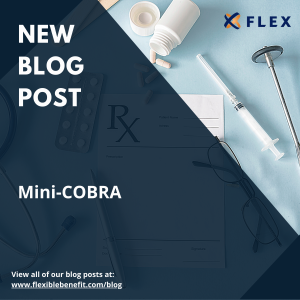HRAs
“Mini-COBRA” is a term commonly used for states that have passed a law to require continuation of coverage rights for group insurance plans that are regulated by the state. Most commonly, Mini-COBRA applies to fully insured medical plans and Health Maintenance Organizations (HMOs). A handful of states also extend continuation of coverage rights to fully insured dental and/or vision plans, and one state (Minnesota) extends continuation of coverage rights to group term life insurance.
Non-grandfathered health plans (i.e., health plans issued on or after March 23, 2010) are required to cover innetwork preventive services at 100% with no cost-sharing to a member. This is a requirement that was imposed by the Affordable Care Act (ACA). The preventive services that must be covered are specified by the Health Resources and Services Administration (HRSA), the United States Preventive Services Task Force (USPSTF), and the Centers for Disease Control and Prevention (CDC).
The Affordable Care Act (ACA) created a research institute known as the Patient-Centered Outcomes Research Institute (PCORI). The goal of PCORI is to help patients and those who care for them make better-informed decisions about healthcare choices. PCORI is funded in part by fees which are charged to health plans. The following information is designed to help employers understand their upcoming payment obligations.
Premium Reimbursement Arrangements (PRAs) can generally be described as tax-free programs which are offered by employers to reimburse employees for health insurance coverage they obtain on their own. Below is a summary of the most common PRAs.
The Affordable Care Act (ACA) created a research institute known as the Patient-Centered Outcomes Research Institute (PCORI). The goal of PCORI is to help patients and those who care for them make better-informed decisions about healthcare choices. PCORI is funded in part by fees which are charged to health plans. The following information is designed to help employers understand their upcoming payment obligations.
The Internal Revenue Service (IRS) recently proposed rules that would expand the definition of medical expenses allowed under Section 213(d) of the Internal Revenue Code (“Code”). This part of the Code is what helps guide the types expenses that can be reimbursed through a Health Reimbursement Arrangement (HRA), Flexible Spending Account (FSA) or Health Savings Account (HSA).
The economic stimulus bill that we’ve all been hearing about has officially been approved by Congress and was signed into law by President Donald Trump on Friday. This $2 trillion bill will provide stimulus checks to many Americans, increase unemployment benefits for workers and provide low interest loans for many small businesses, among many other things.
It’s no surprise that more and more employers are offering qualified high deductible health plans (HDHPs) to their employees, and some employers are combining Health Reimbursement Arrangements (HRAs) and Health Savings Accounts (HSAs) to alleviate a portion of the deductible and/or out-of-pocket expenses that employees are exposed to. However, you have to be very careful with the HRA plan design in order to preserve HSA eligibility for employees.
The Departments of Labor, Health and Human Services and the Treasury (collectively, the Departments) released new guidance on June 13, 2019 which permit a new type of Health Reimbursement Arrangement, referred to as an Individual Coverage Health Reimbursement Arrangement (ICHRA).










